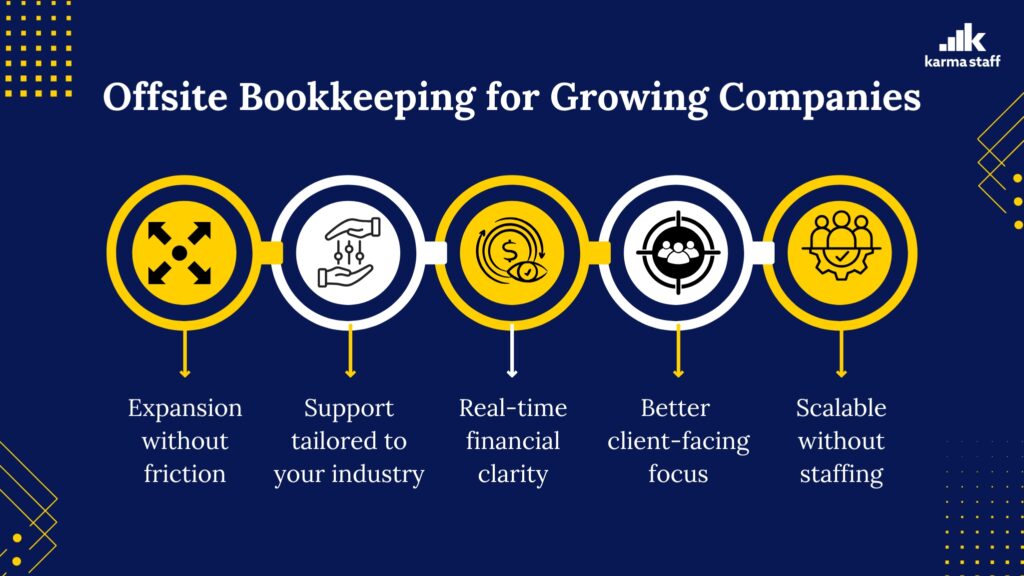Managing business finances goes beyond basic spreadsheets. Owners are expected to track every dollar that comes in or goes out while staying compliant with tax laws, paying employees on time, and preparing reports for banks or investors. But doing all this internally can eat away at your resources. This is why many businesses are turning to offsite bookkeeping as a more efficient and budget-friendly option.
How Does Offsite Bookkeeping Work?
Rather than managing financial tasks internally, many businesses choose to delegate their accounting functions to professionals who work remotely. This is the core idea behind remote bookkeeping solutions. Everything from recording transactions and reconciling accounts to preparing monthly reports and organizing tax-ready documents is handled by a remote team.
The bookkeeper uses cloud-based software to access your financial data. Tools like QuickBooks Online, Xero, and Wave enable real-time collaboration without being tied to a desk in your office. You get access to your books 24/7 while they work on your numbers remotely.
Why Choose Offsite Over In-House Bookkeeping?
Let’s compare both options based on cost and efficiency
In-house bookkeeping:
- Salaries for full-time positions are high
- Extra costs for payroll taxes, benefits, equipment, and training
- Requires physical space and oversight
Offsite bookkeeping:
- Pay only for the hours or tasks completed
- Remote talent is more affordable compared to local hires
- No need for equipment, supervision, or physical space
You save not only on labor costs but also on indirect costs like onboarding and IT support. That’s why offsite bookkeeping has become especially popular with startups and growing businesses.
What Services Are Typically Included?
Most offsite bookkeeping services offer:
- Daily or weekly transaction posting
- Account reconciliation
- Profit and loss reporting
- Cash flow tracking
- Payroll preparation
- Accounts receivable and payable monitoring
- Budgeting assistance
Some advanced providers may even include tax filing, invoicing systems, and audit preparation. These services can be customized based on your needs and business size.
How Much Time Can You Save?
Business owners spend around 5 to 10 hours each week managing books. That’s more than 40 hours every quarter spent doing non-revenue-generating tasks.
Using offsite bookkeeping helps reclaim those hours. When a remote expert maintains your financial records, you no longer have to block time for categorizing expenses, chasing receipts, or preparing reports. That extra time gives you the freedom to stay focused on what actually moves your business forward.
Can Offsite Bookkeeping Handle Industry-Specific Needs?
Many offsite bookkeeping services specialize in niche areas. Here’s how they tailor solutions by industry:
Construction and trades
- Job costing
- Vendor payment tracking
- Equipment depreciation logs
E-commerce and retail
- Inventory syncing
- Sales tax tracking across states
- Refund and return accounting
Healthcare and wellness
- HIPAA-compliant data handling
- Billing cycle management
- Insurance reimbursements
How Are Businesses Benefiting from Offsite Bookkeeping?
Across different industries, businesses are experiencing clear operational improvements by switching to offsite financial bookkeeping. These aren’t theoretical advantages but actual outcomes reported by business owners.
- A creative agency delegated financial tracking to a remote team. They were able to stay focused on deadlines and client campaigns without worrying about receipts or spreadsheets.
- A retail company using Xero shared how their month-end close became more streamlined after going offsite. The process became faster and required fewer adjustments.
- A wellness clinic saw major relief after partnering with a remote team familiar with healthcare billing. It allowed them to spend less time on reimbursement issues and more on patient care.
- An online coaching business worked with a remote team that synced their CRM and payment platforms. They could view income patterns and client payment statuses without digging through reports.
- A food services startup said their offsite dashboard made it easier to stay financially informed before making business decisions or meeting with investors.

Why Is Offsite Bookkeeping a Smart Fit for Growing Companies?
Many businesses rely on offsite bookkeeping services not just for convenience but to actively support growth and long-term control. Here’s how it plays a key role:
1. Expansion without friction
A SaaS company expanding across multiple states relied on a remote team to manage vendor payments and payroll logistics, removing bottlenecks during their growth phase.
2. Support tailored to your industry
A healthcare clinic benefited from industry-specific expertise, allowing its staff to delegate complex billing processes while maintaining accuracy.
3. Real-time financial clarity
Retailers working with offsite bookkeepers used live dashboards to guide decisions like inventory restocking and promotional offers.
4. Better client-facing focus
A creative agency gained back valuable work hours to spend on client service instead of managing ledgers.
5. Scalable without staffing
Many businesses reported that instead of hiring new finance staff as they grew, they simply expanded their offsite service plans.
Conclusion
Choosing offsite bookkeeping is not just about outsourcing; it’s about upgrading your financial efficiency. With customized services, time savings, scalable pricing, and fewer errors, your business can stay compliant and grow faster without being bogged down by spreadsheets. If you partner with the right team offering reliable offsite bookkeeping services, you’ll find yourself with more time, more clarity, and more peace of mind.
FAQs
1. How does offsite bookkeeping help reduce business costs?
It eliminates costs for salaries, office space, and equipment since you pay only for the services you use.
2. Is my financial data secure with an offsite bookkeeping service?
Yes, offsite bookkeepers use encrypted, cloud-based tools with advanced security to protect your data.
3. What bookkeeping tasks can I outsource to an offsite provider?
You can outsource tasks like transaction posting, reconciliation, reporting, payroll, and accounts management.
4. What software do offsite bookkeepers typically use?
They commonly use cloud tools like QuickBooks Online, Xero, and Wave for real-time access and collaboration.
5. Can offsite bookkeeping help with tax preparation?
Yes, many services include tax-ready reports, document organization, and even filing support.







